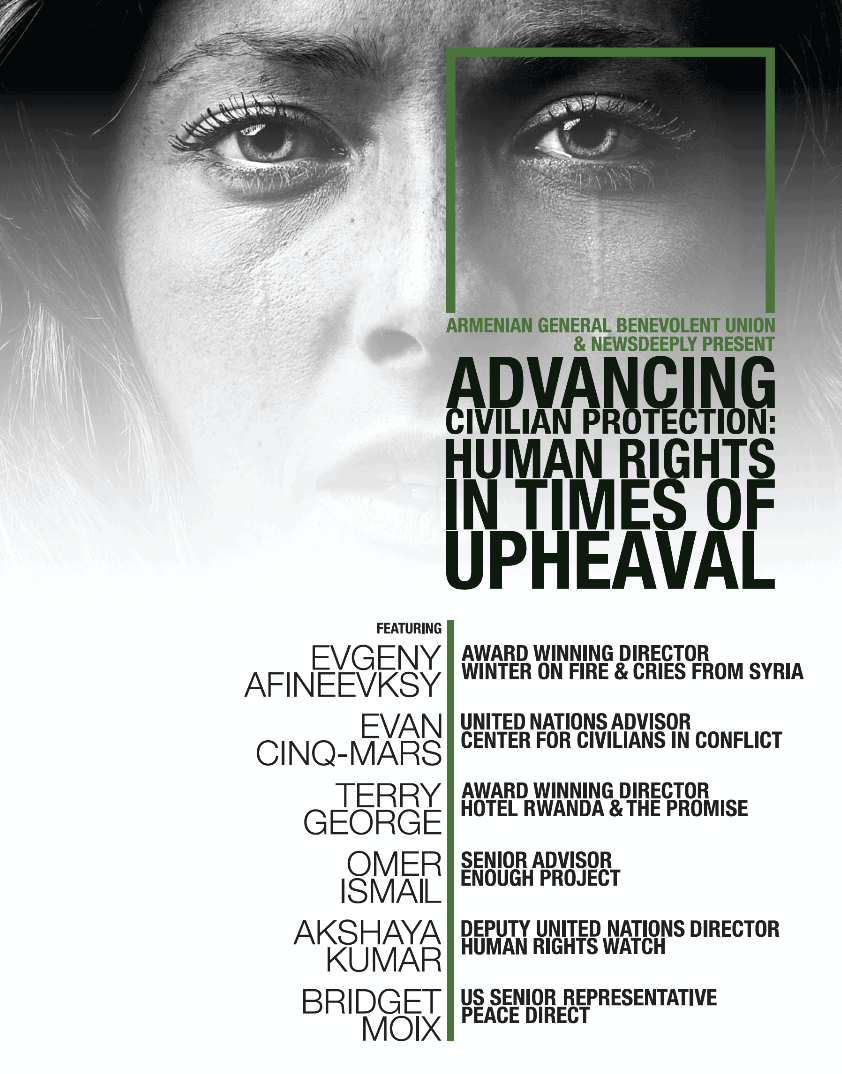Awareness and conversation are crucial. They were crucial in our past, remain crucial in our present and are critical for our future and our children’s future.
Many people debunk conversation as ‘not taking action’. However, it’s the complete opposite of that. When people engage in conversation and are aware of history, current events, current policy and decision making- their conversation causes urgency amongst the elite.
Additionally, those conversations spark the minds of the young and causes them to think about these global topics their history, and their rights – as the youth of today, will serve as the better leaders of tomorrow
The Armenian Benevolent Union and & News Deeply hosted a panel at the Harvard Club, in New York, surrounding the conversation of “Advancing Civilian Protection: Human Rights In Times of Upheaval.” It was moderated by International Journalist Anna Therese Day.
Lara Setrakian, co-founder of News Deeply started off the night with a welcome and some thoughts. In her opening remarks she said: “None of this is new to most of us, but too many people have gone through it…” – Hinting at the urgency and importance of having these open conversations and discussions.
The conversation was divided into two panels.
The first panel had Omar Ismail (Senior Advisor of the Enough Project), Bridget Moix (US Senior Representative of Peace Direct), Ashaya Kumar (Deputy United Nations Director of The Human Rights Watch), Evan Cinq-Mars (United Nations Advisor – Center for Civilians in Conflict). The panel not only shed light and focused on genocide/remembrance day but the discussion went further into discussing what lessons history could teach us – in terms of what we can learn from the past moving forward. The panelists all shed light on the important work that they do in their respective fields and organizations.
When it came to discussing the media and how to navigate through the landscape and create positive impact – one of the panelists, Kumar, had a notable response. She said: “The primary work that we do at Human Rights Watch is hearing people’s stories- is taking them down and then applying those stories to the law, to make sure that people get a chance to have those stories… have their harms, have their crimes committed against them, recognized. Giving them the dignity of process, and hopefully the dignity of a verdict that will recognize what happened to them.”
Kumar’s point was an important one; in a world in which ‘storytelling’ is not deemed as important as ‘policymaking’ – when the reality is that they go hand in hand. To advance the policy, the law or the decision; one must know the story of those in which the decision affects.
The second panel consisted of Evgeny Afineevksy (Award Winning Director – Winter on Fire & Cries in Syria), Terry George (Award Winning Director – Hotel Rwanda & The Promise), and Sherine Tadros (UN Representative of Amnesty International). All the panelists carried the conversation with passion. One could tell that there was a yearn for change and a calling for the audience to take action in any way they can as well.
When the floor was opened to the audience for questions, the crowd did not shy away. One woman was so inspired by the conversation, she asked the panelists about ways in which she can make a change herself (as she is not backed by any ‘agency’ per se). She was saying how having open conversations is great, but was wondering; what can she actually do beyond the discussions. She specifically asked for three things that she could leave with and apply to her life. All the panelists gave her more or the less, the same responses.
They iterated that the power of conversations and discussions should not be taken lightly as it actually makes a difference. They urged her to call members of congress and fight for certain bills. They also asked her and everyone in the audience to involve the youth. When the youth is involved, the future is involved.
Overall, it was a night that served as a reminder, that there is a lot more to do. We should be aware of our history, in tune with our present and fight/work towards the future we believe in.
We all play a pivotal role in to what our futures will look like. Through stories, conversations, awareness, films and open discussions – we can be well on the right track. There’s a lot of work to do, but if we really want to; the work can and will be done.
